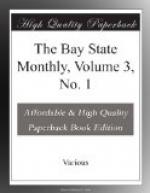“While so lying by the fence some one shook me and said, ‘Get up here.’ In answer I said, without throwing the blanket from over my head, ’Who in thunder are you?’ The answer was made, ’Get up here and see the Colonel of the Massachusetts Twelfth.’
“The speaker then partly pulled the blanket off my head and I saw that it was Colonel Fletcher Webster; whereupon I arose, and we sat down together and I sent my orderly for coffee.
“We sat there drinking the coffee and talking about his father, Daniel Webster, and he told me about his father going up to Franklin every year and always using the same expression about going. He would say ’Fletcher, my son, let us go up to Franklin to-morrow; let us have a good time and leave the old lady at home. Let us have a good old New Hampshire dinner—fried apples and onions and pork.’ At about that time the Adjutant of Colonel Webster’s regiment came along and told him that the General commanding his brigade wanted to see him. Colonel Webster replied that he would be there shortly.
“As he sat there on the blanket with me he took hold of his left leg just below the knee with both hands and said: ’There, I will agree to have my leg taken off right there for my share of the casualties of this day.’ I replied: ’I would as soon be killed as lose a leg; and the chances are a hundred to one that you won’t be hit at all.’ ‘Well,’ said he as he gave me his hand, ‘I hope to see you again; goodbye.’ I never saw him again. He was killed that day. His extreme sadness, his depression, was perhaps indicative of a conviction or presentiment of some impending misfortune.”
* * * * *
OLD DORCHESTER.
By Charles M. Barrows.
The quaint old Puritan annalist, James Blake, wrote as a preface to his book of records:
“When many most Godly and Religious People that Dissented from y’e way of worship then Established by Law in y’e Realm of England, in y’e Reign of King Charles y’e first, being denied y’e free exercise of Religion after y’e manner they professed according to y’e light of God’s Word and their own consciences, did under y’e Incouragment of a Charter Granted by y’e S’d King, Charles, in y’e Fourth Year of his Reign, A.D. 1628, Remoue themselues & their Families into y’e Colony of y’e Massachusetts Bay in New England, that they might Worship God according to y’e light of their own Consciences, without any burthensome Impositions, which was y’e very motive & cause of their coming; Then it was, that the First Inhabitants of Dorchester came ouer, and were y’e first Company or Church Society that arriued here, next y’e Town of Salem who was one year before them.”
Nonconformity, then, was the “very motive and cause” which settled Dorchester, the oldest town but one in Puritan New England, and planted there a sturdy yeomanry to whom freedom of conscience was




